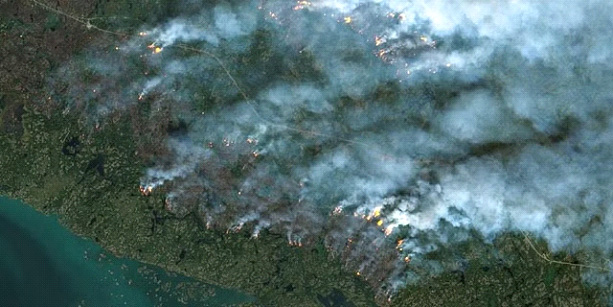
YELLOWKNIFE (TIP): Thousands were fleeing wildfires advancing on one of the largest cities in Canada‘s far north on August 17, as convoys snaked south to safety on the only open highway and evacuation flights took off from the airport.
The order to evacuate Yellowknife in the Northwest Territories marks the latest chapter in a terrible summer for wildfires in Canada. More than 20,000 residents of the regional capital have been given until noon Friday to leave.
Emergency responders were constructing firebreaks, installing sprinkler lines and water cannons, and laying fire retardant in an effort to prevent the blaze from reaching the city — which remained a real possibility in coming days, officials said.
Northwest winds over the next two days will send the fire “in directions we don’t want,” said Mike Westwick, Northwest Territories’ fire information officer.
Heeding Wednesday’s evacuation order, Tiffany Champagne was one of many who crammed into the airport in Yellowknife awaiting flights — the first departing at 1:00 pm (1900 GMT).
“I have asthma and the wildfire smoke was making it increasingly difficult to do anything,” Champagne, wearing a face mask, told public broadcaster CBC.
Carriers WestJet and Air Canada announced they were increasing flights out of the city.
As of Thursday, more than 1,000 wildfires were burning in Canada, including about 230 in the Northwest Territories, where more than 8,100 square miles (21,000 square kilometres) have been set ablaze.
In British Columbia in western Canada, an evacuation order was put in place for the city of West Kelowna, which was under threat of a different fire.
In addition to those travelling by car, some 5,000 had been evacuated on emergency flights as of Thursday night.
Yellowknife Mayor Rebecca Alty warned drivers being led out in kilometres-long convoys that the flames were skirting the edges of highways and they would encounter limited visibility as thick smoke turned the sky orange.
North’s largest ever evacuation
Crews scrambled to erect fire barriers as one blaze got to within 16 kilometres (9 miles) of Yellowknife. Water bombers were seen flying low over the city, and swooping in to fill up at a nearby lake.
Resident Sylvia Webster said “a lot of trees were cut down and sprinkler lines were set up around the city” to bolster its defences.
“We might still lose everything, but that’s okay,” she told AFP. “As long as our loved ones are safe, we can move on from there.”
Prime Minister Justin Trudeau interrupted his summer vacation Thursday to convene an incident response group.
Several military aircraft have already been dispatched, along with more than 120 soldiers to help beat back the flames.
In what had already been declared the Northwest Territories’ largest-ever evacuation, the emptying of Yellowknife now means half the population of the near-Arctic territory will soon be displaced.
Several towns and Indigenous communities were already under evacuation orders.
On Monday, the Canadian military started airlifting residents of smaller far-flung communities in the region to safety after roads were engulfed in flames.
For many, it was the second time in recent months that residents were forced to evacuate. (AFP)
Socialist wins key Spanish parliament vote that could pave way for new center-left government
MADRID (TIP): Spain’s newly elected Parliament voted August 17 by a majority to elect a Socialist candidate as chamber speaker, breathing some life into acting Socialist Prime Minister Pedro Sánchez´s aspirations of forming another leftist government.
The crucial vote was won by Francina Armengol with 178 votes in the 350-lower house of parliament, against 139 for the main conservative Popular Party’s candidate.
It was the first parliamentary vote since inconclusive national elections on July 23 left no group with an easy path to form government. Parties on the left and right have almost an equal number of seats.
It remains to be seen if Sánchez can round up the same support should he be called on by the king to try to form a government. If not, a new election could be around the corner.
The parliament was also to vote on eight members of the speaker’s presiding council, a body that sets the agenda for parliamentary sessions.
Armengol won with the support of 14 votes from two separatist parties in the northeastern region of Catalonia, including seven from Junts (Together), a radical Catalan separatist party led by fugitive politician Carles Puigdemont, who resides in Brussels after fleeing Spain following his unsuccessful 2017 secession bid.
Junts were quick to point out that the vote was solely for the speaker position and did not indicate the party would back Sánchez. (AP)





Be the first to comment